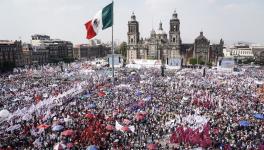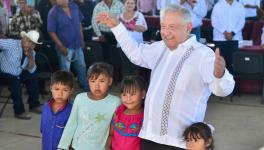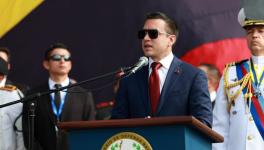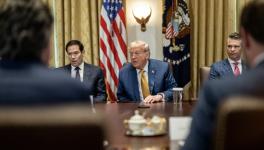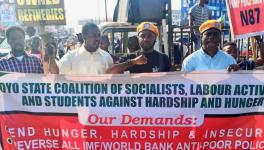How Latin America and the Caribbean are Dealing With COVID-19
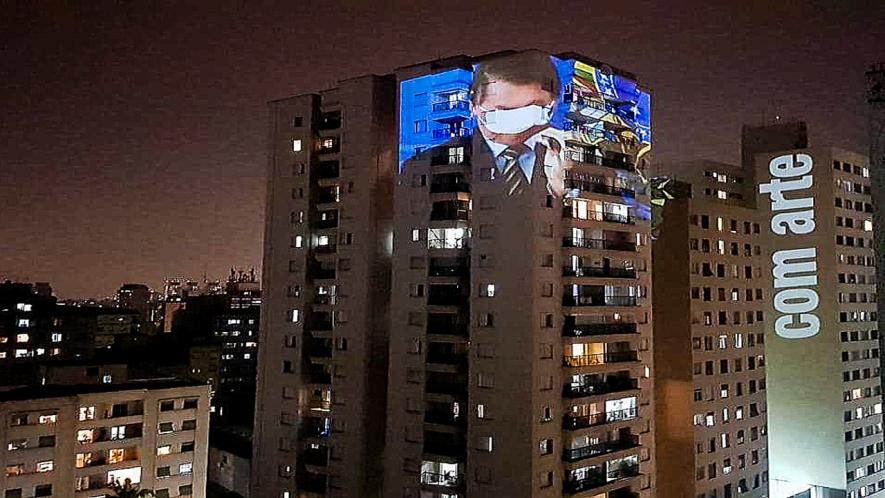
The government of Jair Bolsonaro has been severely criticized for its flawed handling of the COVID-19 pandemic. Here, an image of Bolsonaro failing to put on a mask properly is screened on a building as a mark of protest. Photo: Brasil De Fato
Worldwide, the number of confirmed cases of COVID-19 is close to 340,000 and over 14,700 have died (as of March 23). Europe, the epicenter of the pandemic, has seen an exponential rise in the number of cases with governments scrambling to contain the spread and make up for their slow response.
The United States closely follows Italy, Spain and Germany with over 35,000 confirmed cases. In Asia, several countries have been relatively successful in containing the spread of the virus although risks still remain.
At the moment, Latin America and the Caribbean are still in the early stages of the outbreak, though by now, almost all countries in the region have registered cases, with the exception of Belize. Brazil and Chile have the highest number of cases confirmed 1,546 and 632.
According to projections, the virus is likely to hit the region hard. On top of this, many countries in the region have seen their public sectors, specifically health and education, ravaged by neoliberal programs of far-right leaders and are unprepared to handle the inflow of patients or provide the testing and coordination that the health crisis will provoke.
The following is a sub-regional analysis of how the virus is spreading and what measures the government is taking.
South America
South America has recorded the highest number of confirmed cases. Responses have ranged from denial to complete quarantine and shut down.
Venezuela took strict measures to prevent the rapid spread of the virus early on. By March 15, flights from Colombia and Europe were already completely suspended and the land and sea borders were closed. Schools and classes were suspended and all non-essential workers were sent home. The order for strict social quarantine was announced for the regions that have been most impacted, including Caracas and the states of Apure, Cojedes, La Guaira, Miranda, Táchira and Zulia. The social missions and structures within communes have been activated to ensure distribution of food, medicine and other crucial supplies while resources have been allotted to the health sector to ensure testing and treatment of all is possible.
The government’s swift response was necessary, especially since the brutal economic sanctions imposed on the country by the US have weakened the capacity of the healthcare system and infrastructure of Venezuela to respond to a challenge of this magnitude. In addition, the Venezuelan government asked for aid in terms of personnel and supplies from China and Cuba who have already responded. They also requested a loan from the International Monetary Fund (IMF). The IMF had announced that it would give special aid-packages for countries to counter coronavirus, but refused to provide the same to Venezuela. Currently, the number of cases in Venezuela is 77.
Argentina took a similar approach and enacted strict measures early on. President Alberto Fernández announced a series of economic, labor and social measures on Thursday, March 19 to stop the spread of COVID-19 in the country and alleviate the economic impact on the most vulnerable. As of March 20, all people in Argentina must remain in obligatory social isolation until at least the end of the month when they will evaluate the situation. The state has deployed the Federal Police and the Gendarmerie to enforce the quarantine.
Fernández allocated substantial funds in order to ensure state support to businesses and workers whose activities are interrupted and vulnerable because of the quarantine, and also increased funds towards unemployment insurance. He also called for a line of credit to ensure the production and availability of basic necessary products and to maintain baseline economic activity.
Before taking office in December, Argentina was going through one of the worst economic crises in history due to the neoliberal economic policies of Mauricio Macri. Upon taking office in December, Fernández immediately worked on fixing the damage made by Macri, especially coming to the aid of the 40% of the population that had been plunged into poverty. The public health sector was also severely weakened under Macri which will be a challenge as Argentina faces the spread of the pandemic. There are currently 266 confirmed cases.
Brazil is at the other end of the spectrum with over 1,5000 cases and 25 deaths. Despite the rapid spread of infection, the national government has been extremely slow to react and implement containment measures. Far-right president Jair Bolsonaro consistently belittled the problem, calling it “media propaganda” and a “fantasy”. He even violated WHO recommendations. Last Sunday March 15, despite recommendations that all mass gatherings be cancelled, Bolsonaro himself appeared at a far-right mobilization in Brasilia in favor of his administration.
Due to the lack of a strong national response, the responsibility has largely rested on the State and city governments to implement the necessary measures. In a press conference on March 21, João Doria, governor of the state of São Paulo, the largest state in the country with over 37 million people, decreed quarantine across the state beginning on Tuesday March 24 until April 7, with possibility to it being renewed. All non-essential businesses and services will be closed.
The State government of Rio de Janeiro under Wilson Witzel also took strict measures. He announced on Thursday, March 19 that domestic and international flights coming from places with high levels of coronavirus infections would be suspended. He also imposed restrictions on ground transportation, including the suspension of inter-municipal and inter-State buses. Quarantine was also imposed and non-essential businesses were ordered to be closed.
Throughout the past couple of weeks, social movements and trade unions have denounced the neoliberal measures of the Bolsonaro government that are weakening the national health system. Since Tuesday March 17, people across the country have participated in cacerolazos [a form of protest where people bang pots and vessels] from their homes to denounce the cuts in health and education by the government, as well as the weak response of the Bolsonaro government to the crisis.
Colombian president Ivan Duque has finally taken strict measures to contain the virus in the country after being ridiculed for praying to the patron saint of Colombia, the Virgin of Chiquinquirá, to protect the population from the virus. On Thursday, Duque announced that as of March 23, no one will be allowed into the country for at least 30 days. Measures to restrict movement of citizens and closure of non-essential businesses and curfews were also announced. Colombia currently has over 230 cases and 2 deaths.
The incarcerated population in Colombia has launched several mass uprisings over the past couple of days denouncing overcrowding and other unsanitary conditions in the prisons that make them especially vulnerable. Organizations are demanding that in light of the extreme overcrowding, all prisoners accused of non-violent crimes should be released. Protests in the La Modelo prison in Bogotá on Saturday night were violently repressed by prison guards and the Mobile Anti-Disturbance Squadron (ESMAD). According to human rights organizations at least 23 were killed in the repression with many being injured.
The small country of Ecuador already has close to 800 confirmed cases of COVID-19 and at least 14 deaths. Due to this alarming rate of infection, Ecuador has been in a state of emergency with a curfew and quarantine order imposed for over a week. Restrictions on domestic and international travel have also been put in place.
Mesoamerica
Mesoamerica is facing a complex situation. The countries in the region have degrees of economical inequality and suffer some of the worst consequences of US imperialism. They have been facing grave social, economic and political crises for the past decade, such as high unemployment, lack of opportunities, lack of investment in public health and education, high rates of violence, and more which is manifested in the mass migration from the region to the US.
Mexico, whose population is 129.2 million, has the highest number of cases in the region (316) followed by Panama with a population of 4 million (313 cases). Costa Rica has 134 confirmed cases followed by Honduras (26) and Guatemala (19). El Salvador has three confirmed cases and Nicaragua two.
El Salvador has put in place exemplary measures in the face of the pandemic. On March 11, before there were any confirmed cases in the country, president Nayib Bukele announced a ban on the entry of all foreigners to the country and on March 16, all commercial flights to El Salvador were suspended. On March 18, with only one confirmed case, he announced a quarantine across the country and the closure of non-essential businesses.
In order to mitigate the economic impact on the service and informal sectors, he announced several economic measures, including a three-month suspension on payment of bills for public services like water, electricity, phone lines and internet, as well as the suspension of payment of rent, loans, mortgage.
He declared: “This is a never-before-seen event, it is not the moment to think that we are going to lose money; [you should] think about your family, do not think that you are immune; no one is immune, not even babies that are in their mother’s wombs.”
Honduras has also mandated a full lock-down and closed all of its borders. However, social organizations in the country have denounced that the government is taking advantage of the crisis to militarize the country and has yet to take humanitarian measures to alleviate the impact of the crisis on the most vulnerable.
An activist in Honduras explained, “Instead of taking measures to combat the disease, the government has taken authoritative measures. It has established curfews and a state of emergency. Military and police patrolling the streets and people aren’t even able to buy food, people have been detained and brought to prison. The presidential order that says who ever goes out and violates curfew may spend six months to two years in prison.”
Organizations have also raised the concern that the government could take advantage of the crisis to embezzle money (as it has done in the past). A key reason for this concern is the fact that in the decree on the emergency budget to fight coronavirus, there is no expense-monitoring mechanism in place as there usually would be. Additionally, the budget is managed by a special emergency secretary, controlled by the military, instead of the health secretary. While the president announced that the emergency budget would be used to build dozens of new hospitals (adding to the mere 30 public hospitals that exist in the country), no advances have been made and the authorities from the Medical College of Honduras have reported that the supplies that the government has purchased did not correspond to what they need.
There is great fear among the population of what will happen when the virus takes hold in the country. At least 60% of employment in Honduras is in the informal sector and the government has not made any announcements on how it will aid those who are unable to receive income.
The Mexican government under president Andrés Manuel López Obrador has also been harshly criticized for its lax approach. As of now, the government has not enacted a quarantine order and restrictions on travel are minimal. While some stricter measures have been taken at a state and city level, the rate of infection of COVID-19 in Mexico is likely to increase rapidly if the national government does not act.
Both Panama and Costa Rica have restricted entry to all non-residents and ordered all non-essential businesses to close.
Caribbean
In the Caribbean region, the islands with the highest number of confirmed cases are the Dominican Republic with 202 confirmed cases, Guadeloupe with 45 (March 19), and Martinique with 32 (March 19). Cuba, which has recorded 35 cases, seems to have been able to slow down infection rates.
While the numbers look comparatively less to other regions, it is important to keep in mind that the population of these islands is very small. Cuba has the largest population with 11.2 million people and with the exception of Cuba, Haiti, Jamaica, the Dominican Republic, Puerto Rico and Trinidad and Tobago, all of the islands have less than one million people. As such, these numbers and the current rate of infection is cause for concern.
In addition, many of these small islands do not have sufficient public health infrastructure to treat patients. Already the governments of Jamaica, Saint Kitts and Nevis, Saint Vincent and the Grenadines have requested support from the Cuban government with medical personnel, infrastructure, medicine and a treatment plan.
Many worry about the spread of the virus in Haiti where there have been two cases reported as of now. However, the lack of access to essential public services like water, the lack of proper sanitary conditions, the decimated public health infrastructure due to neoliberal attacks, as well as the ineptitude of the government led by Jovenel Moïse, have led many to fear that the infection may spread rapidly.
The Caribbean islands have taken different measures in order to curtail the spread of the virus. While Haiti and Trinidad and Tobago have called for a complete closure of their borders, the majority of the Caribbean islands have put partial travel restrictions in place. The restrictions range from barring passengers coming from COVID-19 outbreak hotspots such as Europe and East Asia and calling for those arriving from abroad to self-quarantine for at least two weeks.
Get the latest reports & analysis with people's perspective on Protests, movements & deep analytical videos, discussions of the current affairs in your Telegram app. Subscribe to NewsClick's Telegram channel & get Real-Time updates on stories, as they get published on our website.










